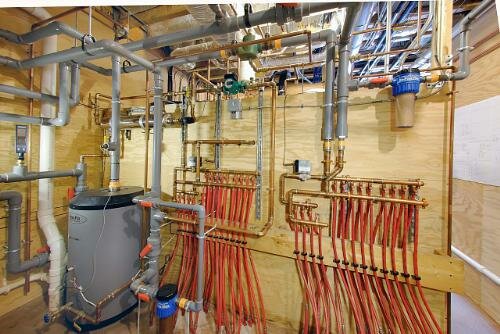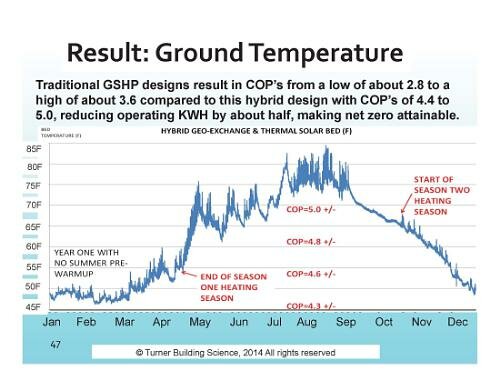Use of Hybrid Solar/Geothermal Heating and Cooling Design Expanded

The H L Turner Group Inc. was awarded a US Patent for its high efficiency “E-Max Hybrid™” solar/geothermal heating and cooling system design earlier in 2014. The hybrid design can yield geothermal system performances upwards of a 7.5 effective COP (Coefficient-of-Performance) during optimum conditions, about twice that of conventional geothermal applications.
Average long-term performance over wide operating conditions still exceeds an effective COP above 5.0. A ground loop geothermal version of the system, designed around standard Bosch Thermotechnology equipment, was recently incorporated into a zero-net-energy residence known as the ROSE Cottage Project, which was designed by The H L Turner Group Inc., and featured on the RCMZeroEnergy.com website.
Harold Turner, Jr., PE, President & CEO of the Turner Group, commented: “The use of cost-effective hybrid solar/geothermal heating and cooling systems are also widely applicable to commercial, industrial and institutional projects where the larger economy of scale helps to further decrease the front end capital cost/sf of renewable energy features. We are seeing accelerated applications of new renewable technologies across the country as Zero Net Energy (ZNE); Zero Energy Building (ZEB); and Near Zero Net Energy (NZE) projects continue to proliferate while energy prices continue to rise in a competitive worldwide energy marketplace.”
The ROSE Cottage Project was completed in late 2012 and is located in a rural neighborhood in the capital city of Concord, New Hampshire. In addition to being a net-zero home, this green building project features multi-generational use and aging-in-place features as part of a sustainable design that incorporates long life cycle values. The ROSE Cottage Project was the basis for winning the 2013 Marvin Architect’s Challenge Showdown and a 2013 Bosch Green Living Award. Recently the project earned three “Cornerstone Awards” from the Home Builders and Remodelers Association of New Hampshire (HBRANH). The home remains part of the RCMZeroEnergy.com educational website initiative to promote the use of the zero-net construction through web-based contact with consumers, builders, and developers. A free e-newsletter, “The Zero Net“, also compliments the website.


